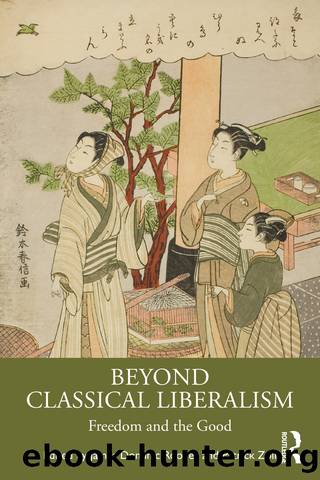Beyond Classical Liberalism by James Dominic Rooney;Patrick Zoll; & Patrick Zoll

Author:James Dominic Rooney;Patrick Zoll; & Patrick Zoll
Language: eng
Format: epub
Publisher: Taylor & Francis (Unlimited)
Published: 2024-04-15T00:00:00+00:00
4 Is Confucian perfectionism a moderate perfectionism?
Joseph Chan has sought to combine moderate perfectionism with Confucianism.29 In this part, I examine briefly his theory of Confucian perfectionism, thus clarifying the nature and limits of moderate perfectionism.
Let us start with how Confucianism is related to perfectionism. Confucianism is an ethico-political doctrine that began life in China more than 2,500 years ago and has deeply influenced the development of East Asia. Confucians do not hold the same view on ethics and politics (so one may prefer to speak of Confucianisms instead of Confucianism); however, Confucians invariably think that political leaders and authorities are morally obligated to promote peopleâs material welfare and help them cultivate virtue. As such, Confucianism is a perfectionist doctrine. Moreover, Confucians (ancient Confucians, at least) generally hold systematic views ofâto borrow Rawlsâs words again:
[W]hat is of value in human life, and ideals of personal character, as well as ideals of friendship and of familial and associational relationships, and much else that is to inform our conduct, and in the limit to our life as a whole.30
Thus, it is proper to say that Confucianism is a comprehensive perfectionism consisting of a particular comprehensive moral doctrine.31
Few contemporary Confucians have argued that the state should seek to promote Confucianism as a comprehensive moral doctrine.32 Contemporary Confucians generally think that Confucianism has valuable insights into ethics and politics, but that it would be inappropriate for any modern state to promote Confucianism in its entirety, given that people living in modern societies hold divergent moral views.33 They believe that if Confucianism is to make positive contributions to modern politics and political discourse, then those aspects of Confucianism that are unsuitable for the modern world need to be revised, rectified, or abandoned.34
It is against such a background that Chanâs Confucian perfectionism makes original theoretical contributions. Chan describes Confucian perfectionism as âan unusual projectâ because it is âa critical reconstruction of certain Confucian political ideas of the classical period for modern times.â35 In fact, Chanâs project is not only unusual but also ambitious: it seeks to explore the implications of Confucianism for a variety of fundamental issues in politics, including political authority, democracy, human rights, civil liberties, and social and economic justice.36 The ultimate goal is to provide âan attractive philosophical alternative to liberal democratic theory.â37
There is a basic question about Chanâs project: how should Confucian perfectionism shape the legislation and public policymaking of a modern liberal state? To Chan, Confucian perfectionism can take either the form of moderate perfectionism or that of extreme perfectionism, and he intends Confucian perfectionism to take the form of moderate perfectionism.38 Importantly, he argues: âConfucianism can be actively and publicly promotedâ in the form of moderate perfectionism despite his view that, in public political discourse, citizens and state officials âshould not present Confucianism as a complete and packaged conception and ask citizens to accept policy proposals as implications of that package.â39
By contrast, extreme perfectionism is the view that the state ought to adopt a certain comprehensive moral doctrine as the basis of state policy.
Download
This site does not store any files on its server. We only index and link to content provided by other sites. Please contact the content providers to delete copyright contents if any and email us, we'll remove relevant links or contents immediately.
Spell It Out by David Crystal(36110)
Life for Me Ain't Been No Crystal Stair by Susan Sheehan(35802)
Cecilia; Or, Memoirs of an Heiress — Volume 1 by Fanny Burney(32546)
Cecilia; Or, Memoirs of an Heiress — Volume 2 by Fanny Burney(31943)
Cecilia; Or, Memoirs of an Heiress — Volume 3 by Fanny Burney(31929)
The Great Music City by Andrea Baker(31916)
Professional Troublemaker by Luvvie Ajayi Jones(29651)
The Secret History by Donna Tartt(19052)
We're Going to Need More Wine by Gabrielle Union(19034)
Twilight of the Idols With the Antichrist and Ecce Homo by Friedrich Nietzsche(18622)
All the Missing Girls by Megan Miranda(15952)
Cat's cradle by Kurt Vonnegut(15334)
Pimp by Iceberg Slim(14488)
Bombshells: Glamour Girls of a Lifetime by Sullivan Steve(14056)
For the Love of Europe by Rick Steves(13905)
Talking to Strangers by Malcolm Gladwell(13347)
Norse Mythology by Gaiman Neil(13345)
Fifty Shades Freed by E L James(13232)
The Social Justice Warrior Handbook by Lisa De Pasquale(12187)
